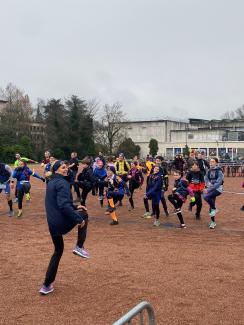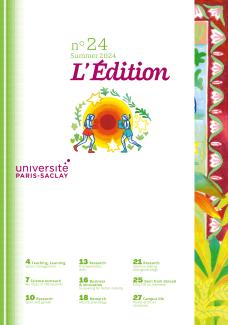
Sports management: a field of study that's proving its worth at Université Paris-Saclay
Over the past year, the Organising Committee for the Olympic and Paralympic Games (OCOPG) has multiplied its workforce to meet the immense challenge that organising this major world sporting event presents. A golden opportunity for many alumni of the Faculty of Sports Sciences at Université Paris-Saclay, which offers a whole range of education pathways focusing on sports management.
(This article was originally published in L'Edition No. 24)
The Paris 2024 Olympic and Paralympic Games will bring together nearly 15,000 athletes for 29 days of competition at 61 venues across France. More than 4,000 employees of the Organising Committee for the Olympic and Paralympic Games (OCOPG) will also be working behind the scenes to ensure the smooth running of the events, including alumni from the Faculty of Sports Sciences at Université Paris-Saclay.
"We have many former students who have joined the OCOPG. Some students from this year's graduating classes are also doing their internships there," confirms Christopher Hautbois, Dean of the Faculty. "It's a source of pride for us to see them pursuing a professional career that matches their aspirations. It gives us a sense of accomplishment." One of the Faculty's missions is indeed to provide education for professions linked to the management and organisation of physical and sporting activities for all types of audiences, which is why it offers a full pathway focusing on sports management.
Degrees with an established reputation
The pathway is part of the STAPS (Science and Techniques of Physical and Sports Activities) field of study and starts at undergraduate level. "Specialisation in sports management begins in the second year of the degree, then continues in the third year with courses entirely focused on this field," adds the Dean and professor at the Faculty. Once they have obtained their bachelor's degree, graduates have the option of continuing their studies at Master's level, with two possible specialisations in the second year: on the one hand, the SLEM (Sport, leisure and event management) pathway, and on the other, the PPSOS (Public Policies and Strategies of Sports Organisations) pathway.
"The 2nd year Master's degree SLEM prepares students for careers in sports events, sports marketing, sports sales, sponsorship and event organisation, while the 2nd year Master's degree PPSOS prepares them to work on public policy or in sports organisations such as federations," explains Michel Desbordes, professor and head of the 2nd year Master's degree SLEM. Like the second one, this first degree is not new. SLEM was created in 1999, and PPSOS in 2004. And both have made a name for themselves. While the number of sports management courses has multiplied in recent years, particularly in business schools, "our track record and reputation are our strong points," asserts Michel Desbordes. All the more so given that both education pathways have evolved over time.
Since 2020, the 2nd year Master's degree SLEM, for example, has been entirely taught in English. "In the world of sports management, working teams have become much more globalised. By following the careers of our alumni, we realised that a lack of English could be a barrier," the head explains. In the wake of this adjustment, international students are now joining the Master's programme.
Gaining exposure to the professional sector as early as possible
"Whatever pathway they follow, we want to give everyone the chance to experience the professional sector as early as possible," explains Christopher Hautbois. This is another crucial aspect of the Sports Management field of study. "Thanks to our location in the Paris region, we've built up a very extensive professional network," adds Michel Desbordes. Every year, speakers from a wide variety of backgrounds come to share their experiences with the different classes. But, more than anything, this discovery of the professional sector involves internships, from the third year of the undergraduate degree right through to the Master's degree.
"The SLEM pathway is divided into a six-month course and a six-month internship. And the PPSOS pathway is available as a work-study programme," explains the Dean of the Faculty. Similarly, right from undergraduate degree level, the courses include numerous projects, including the famous Noctiraid. Organised for the last fifteen years by the 2nd year Master's degree SLEM students, this night-time team raid, combining trail running, mountain biking, orienteering, shooting and a bike & run, attracts some 300 participants every year.
"It's really in the DNA of this Master's programme to educate its students in the organisation of major sporting events. There aren't always Olympic and Paralympic Games, but, including in France, there are always international sporting events to be organised somewhere," explains Christopher Hautbois. "Thanks to our alumni network, we often hear from each other. And this confirms that we have a remarkable rate of professional integration."
Learn more :
- Website of the Faculty of Sports Sciences : www.faculte-sciences-sport.universite-paris-saclay.fr
"Organising the Olympic and Paralympic Games is an unbelievable experience!"
The Paris 2024 Olympic and Paralympic Games are an exceptional event that won't be happening again anytime soon. But for some alumni of the Faculty of Sports Sciences at Université Paris-Saclay, it's also a dream come true.
"Organising the Paris 2024 Olympic and Paralympic Games is a crazy and unbelievable experience!" says Emma Bouttier. A 2023 graduate of the Faculty of Sports Sciences at Université Paris-Saclay, this alumnus is one of thousands of employees of the Organising Committee for the Olympic and Paralympic Games (OCOPG) who have been hard at work for months preparing for this major global sporting event. "I'm operations coordinator at one of the Olympic and Paralympic venues – the North Paris Arena, in Villepinte - where boxing, fencing, modern pentathlon and sitting volleyball events will be held," she explains. "My role is almost like being the orchestra conductor of the whole site," which will welcome up to 10,000 spectators a day during the Olympic and Paralympic Games. It goes without saying that the challenge is a major one.
When Emma Bouttier began her career in sports management a few years ago, she never imagined she would one day embark on such an adventure. "It was in my third year of undergraduate studies that things really clicked for me. That year, we had to organise sporting events from start to finish, and that opened my eyes to what I wanted to do in the long term," she recalls. "At Université Paris-Saclay, we have the chance to really put what we learn into practice. And you learn so much working on the ground. You realise what you like and don't like, and what you need to work on."
The student soon found herself in the field, first in her undergraduate degree and then in her Master's degree, specialising in SLEM (Sport, leisure and event management). It was then that she completed an internship at the Stade de France, where she was subsequently recruited as an events production manager, donning her first hat as an orchestra conductor. "It's a job that requires you to consider lots of different aspects and take an overall view. In that sense, I've learned a lot from the events organised throughout my education," says the young woman who, after the Paris 2024 Olympic and Paralympic Games, will be returning to the Stade de France team.
The Olympic and Paralympic Games: the perfect opportunity for all profiles
Like Emma Bouttier, Nathan Billard graduated from the 2nd year Master's SLEM programme in 2023. Also like her, he embarked on the ambitious adventure of the 2024 Olympic and Paralympic Games. "I'm the accreditations officer for the Oceania National Olympic and Paralympic Committees," explains the alumnus. "It's a demanding but very interesting job. There's a lot of administration, but also a lot of sport. It really makes the most of my versatile profile." Indeed, Nathan Billard hasn't worked in sports management his whole career.
After six years studying economics, management and international management, he joined Université Paris-Saclay and the 2nd year Master's SLEM programme. "The aim was to get a general education in management and administration, before finishing by specialising in sport," explains the young man, who completed part of his studies in the United States and Spain. "I really wanted to make this seventh and final year worthwhile. Today, I have absolutely no regrets. The 2nd year Master's degree SLEM was a rich year that helped me develop the skills I needed to work in the world of sports." Although he didn't land a Master's internship at OCOPG as he had hoped, the dream eventually became reality.
"I've been thinking about working for the Olympic Games for many years. It was one of the reasons why I decided to enrol in the 2nd year Master's SLEM programme. After graduating, I tried my luck again, and perseverance paid off in the end," enthuses Nathan Billard, who intends to enjoy the adventure to the full despite a very busy schedule.
From spectator to Olympic Games coordinator
Lise Domas, too, has long dreamt of playing a part in the organisation of the Paris 2024 Olympic Games. In summer 2012, she and her family attended the Olympic Games in London. "It was an incredible experience and it made me want to work for the Olympics," says this alumnus of the Faculty of Sports Science. The following year, she enrolled in a STAPS undergraduate degree, then moved into sports management to complete the 2nd year Master's degree SLEM. In 2017, while on an internship with the French Canoe-Kayak Federation, her Olympic dream resurfaced.
"During this internship, I helped to organise the Olympic Day in June 2017. It was the very beginning of the process, and Paris' bid for 2024 had not yet been accepted," recalls Lise Domas. But at the time, 2024 was still a long way off. The student continued on her career path, finding a series of experiences to develop her network of contacts. "We work in an environment where networking is very important. And our education plays a big part in helping us to create one. Being based in the Paris region is also helpful in gaining more experience."
Graduating from the Master's programme in 2018, Lise Domas has held a number of positions, until finally fulfilling her dream. In autumn 2023, she joined the OCOPG as coordinator of site and infrastructure deliveries for the Golf national located in Guyancourt. "My role is to coordinate the installation of the temporary infrastructures that will enable the site to host the Olympic golf events," she explains. "It's very demanding, but I really enjoy what I do. And it's really satisfying to see that I've achieved the goal I set myself so long ago. It's also a unique experience because it will never happen again." At least not in France, although the sports enthusiast is already thinking about repeating her Olympic adventure with the Milan Winter Olympics in 2026.
Learn more :
- Master's degree SLEM (Sport, leisure and event management) : https://www.universite-paris-saclay.fr/en/human-movement-sport-sciences-sport-management/m2-slem
This article was originally published in L'Edition No. 24.
Find out more about the journal in digital version here.
Subscribe to the newsletter and never miss an issue.



